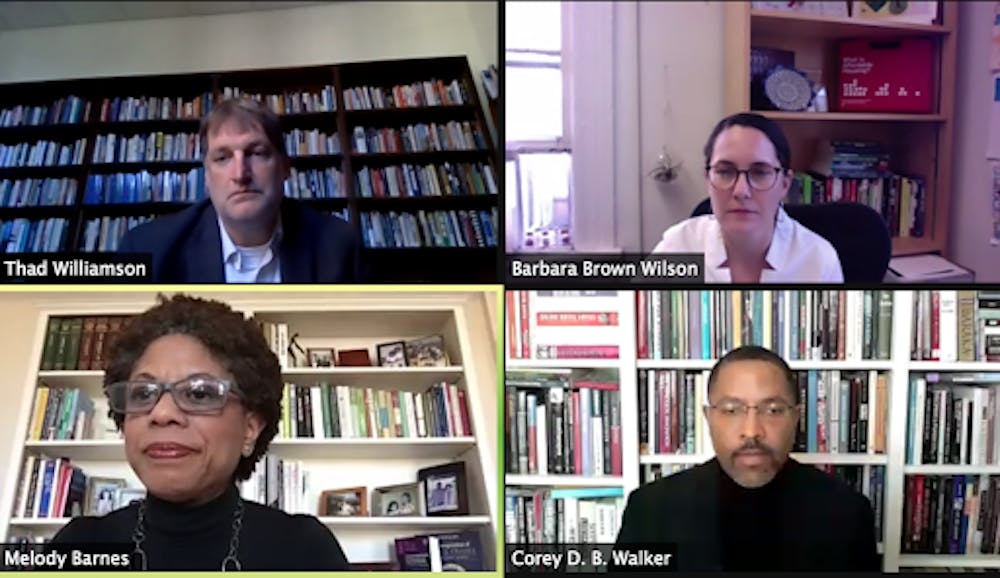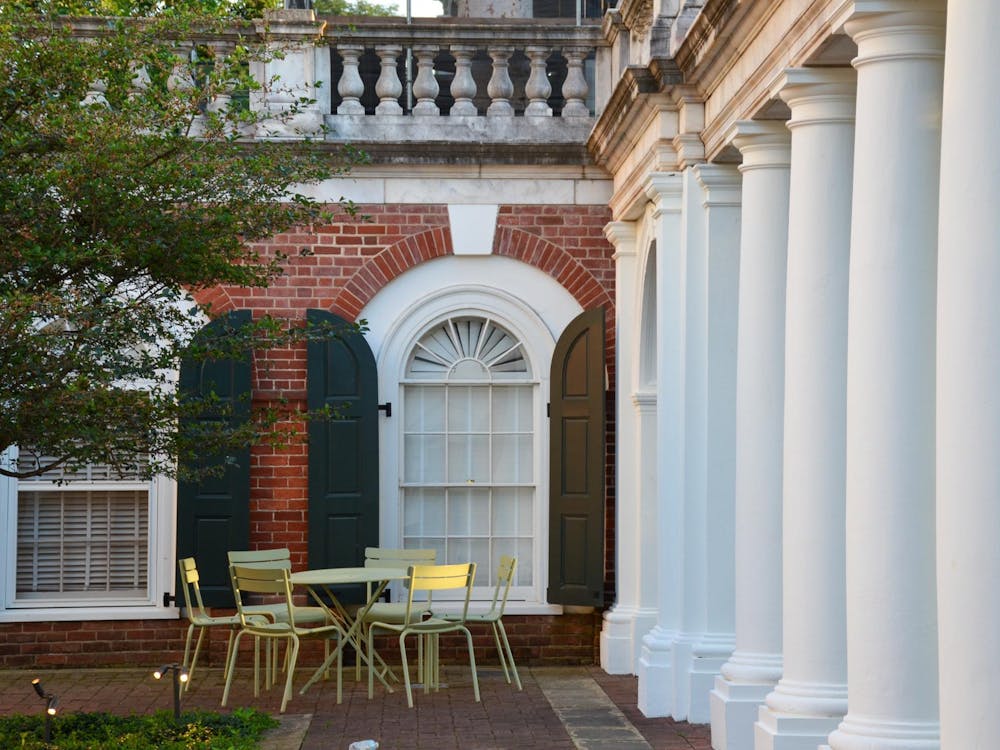Melody Barnes, Barbara Brown Wilson, Thad Williamson and Corey D. B. Walker — editors of the book “Community Wealth Building and the Reconstruction of American Democracy” — led a panel Thursday exploring the country’s current political reality in light of ideal democratic aspirations. The panel was structured as a loose discussion based on questions posed by the audience.
The event was co-hosted by the Miller Center and the Democracy Initiative — an interdisciplinary teaching, research and engagement effort led by the College and Graduate School of Arts & Sciences — and lasted one hour. Approximately 170 viewers streamed the Zoom meeting via the Miller Center website or Youtube, and viewers could ask questions on the Zoom call through the question-and-answer function.
“Community Wealth Building and the Reconstruction of American Democracy,” published in 2020, explores questions regarding the longevity and viability of democracy. In the webinar, Barnes — co-director for policy and public affairs for the Democracy Initiative and a distinguished fellow at the School of Law — spoke about the book, which is centered around the question, “Can democracy work?”
“The goal of the book was to explore concerns about the longevity and viability of democracy,” Barnes said.
Walker, who is a professor of humanities at Wake Forest University, elaborated on this question, saying it is both contemporary and historic and is chiefly animated by “a deep democratic deficit.” He noted that democracy has declined globally and argued that it cannot always serve the good that it is supposed to be able to serve, contributing to a rise of authoritarianism around the world.
According to Freedom House, which tracks democracy globally, “countries that suffered setbacks in 2019 outnumbered those making gains by nearly two to one.”
In response to this concern, Williamson — an associate professor of leadership studies and philosophy, politics, economics and law at the University of Richmond — mentioned that a democracy must satisfy two distinct facets in order to be legitimate and sustainable.
“Democracy, in order to be legitimate, not only has to be procedurally correct but has to be able to address problems,” Williamson said.
Throughout the webinar, in addition to responding to questions asked by viewers, Barnes created several poll questions for attendees to respond to followed by discussion and analysis from the panelists.
The first question asked whether participants feel optimistic or pessimistic about the future of democracy and how that opinion was influenced by the Capitol riots on Jan. 6, when hundreds stormed and thousands more surrounded the Capitol complex in Washington, D.C. to protest the certification of President Joe Biden’s electoral college win.
The poll responses reflected that most participants feel optimistic about the state of democracy right now and that opinion was influenced considerably by the events on Jan 6.
The second poll question asked if participants believe that colleges and universities should be obligated to reserve some of their endowment for community development in the towns in which they are located. An overwhelming majority of participants answered yes to this question.
Following the second poll question, Wilson — faculty director of the U.Va. Democracy Initiative Center and associate professor of urban and environmental planning at the School of Architecture — explained a claim from the book, namely that that university towns continue to be some of the most inequitable communities in the country.
“Charlottesville is a wonderful place for my family to live when you disaggregate the data and look at race and income ... but Charlottesville also has one of the lowest social mobility ranks in the country,” Wilson said.
The University’s endowment at the close of the fiscal year 2020 reached $9.9 billion while Charlottesville has a poverty rate of around 22 percent, compared to a poverty rate of 9.9 percent in Virginia.
Wilson attributes this trend, which also applies nationally, to the fact that many colleges, like the University, rarely think about success in terms of the success of every member of the town that supports them. As such, Wilson said that these institutions must hold themselves “radically accountable” in the metrics used to measure success and acknowledge that responsibility, looking further than just the standard measures of success such as graduation rates and research opportunities offered.
Last year, the University was ranked in the bottom 15 percent in terms of social mobility for its students according to separate rankings by U.S. News and World Report and the CollegeNet Social Mobility Index. U.S. News and World Report listed the University 324th out of 381, while this year, the University is listed 318th out of 388.
Throughout the webinar, the panelists explored other forms of inequality, how those trends appear to change over the course of time and how powerful institutions can wield influence to facilitate positive change. In particular, in light of the University’s 2021 MLK Celebration, the panelists discussed the life and work of Martin Luther King Jr. and how his ideas about equality are still relevant and can be used to influence universities and other institutions to act responsibly and hold themselves accountable.
Thinking through the lens of recent events including COVID-19 and its impact on different communities, protests over the murder of George Floyd, the presidential election and the Capitol insurrection, Barnes also reflected on King’s 1967 book Where Do We Go From Here: Chaos or Community?
Walker commented that in this book, King was reminding everyone that there are no limits to human resources, only limits to human will.
“The question that we’re facing right now, and this is a deep and pervasive question, is a question of human will,” Walker said. “How much do we will to actually live into a democratic enterprise that values all human beings and that provides all of the necessary resources to live up to one’s full potential.
A recording of the event is available on the Miller Center website.







